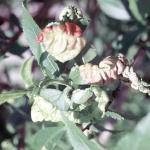Peach Leaf Curl
The fungus Taphrina deformans causes peach leaf curl.
Host Plants
Taphrina deformans can infect peach (Prunus persica) and nectarine (P. persica var. nucipersica).
Description
During cool, wet springs developing leaves become thicker than normal and curled with a yellow to red-purple color.
Within a few weeks, as spores form on the leaf surface, the leaves develop a dusty gray cast. A short time later, the leaves turn brown and drop from the tree. Once this occurs, the disease has run its course for the season. Diseased green shoots swell and turn yellow, while diseased fruit form red, wart-like spots. Peach leaf curl weakens the vitality of the tree by causing early leaf loss. Severely defoliated trees produce fewer fruit and are more vulnerable to winter damage and opportunistic diseases.
Disease Cycle
Taphrina survives the winter as spores within cracks in the bark and under bud scales. When buds break open, spores infect new leaves as they emerge if the weather is cool and wet. Peach leaves, shoots and fruit are susceptible only during the period when they are first developing, and if they are wet. As the tissues mature, they become resistant. The thickened, discolored leaf tissue is actually a fruiting structure for the fungus. Peach leaf curl produces spores on the surface of the infected leaves. During wet weather, rain and wind distribute spores to bark cracks and buds where they survive the heat of summer and freezing of winter until next spring when they can infect young growth as it emerges if conditions are wet.
Management Strategies
Once symptoms peach leaf curl leaf curl are visible fungicide treatment for that season is not effective. Collect fallen leaves, irrigate when dry, fertilize as needed, prune to maintain sound branch structure, and maintain 2-3 inches of composted mulch over as much of the root zone as possible to enhance tree vitality. The fungus survives on the bud and twig surface, so a fungicide application in the autumn after most of the leaves have fallen, or early in the spring just before the buds open is generally an effective control. If peach leaf curl is a persistent problem, especially on a fruit-bearing tree, consider growing the 'Redhaven' and cultivars derived from Redhaven, which is more resistant.
Written by: Dan Gillman
Revised: 09/2011
Photo: P. Pecknold, Plant and Pest Digital Library Project, Purdue University
